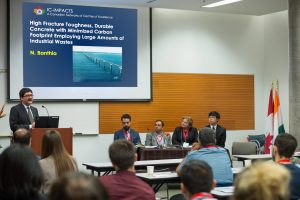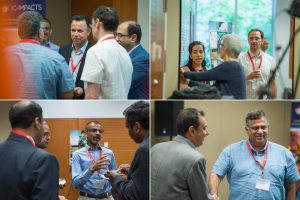On June 14, 2018, IC-IMPACTS hosted its 2018 Research Conference in the Fred Kaiser Building on UBC’s Vancouver Campus. The event welcomed dignitaries and brought together researchers, students, universities, NGOs, and government representatives to deliver up-to-date research findings and discuss opportunities to collaborate across IC-IMPACTS’ three themes: infrastructure, public health, and water.
The event started out by Mrs. Abhilasha Joshi (seen above), delivering the opening remarks. Mrs. Joshi highlighted the unique convergence of research and approach that drives IC-IMPACTS and its focus on developing concrete solutions to real-world problems. She pointed out bilateral initiatives such as creating seismic-resistant infrastructure and building roads using green technology as examples of projects that have an impact on communities and emphasized the need to improve knowledge exchange to enhance global research and development.

Keynote speaker Venkatesh Kodur, Chair of the Department of Civil and Environmental Engineering, Michigan State University, outlined the behaviour of fire in structural systems and discussed the importance of including fire when planning infrastructure improvements. A second keynote speaker, Gautam Shroff, VP, Chief Scientist, and Head of Tata Consultancy Services (TCS) in India, presented the history of TCS research projects and their impact on solving real-world problems.
That set the framework of the day for the three panels—one each on infrastructure, water, and public health—to present material and explore opportunities for cross-thematic collaborations and deployment of technologies in communities in India and Canada.

Nemy Banthia, CEO and Scientific Director, IC-IMPACTS, moderated the first panel of the day, which focused on infrastructure research projects. Panellists who presented their work were:
Panellists delivered updates on their infrastructure research projects, each of which had a public health component. Banthia pointed out that the need for sensors was a common link among them, and potentially among the themes of water and public health. An Indian researcher in the audience observed that in India, there are no standards to monitor infrastructure over time, emphasizing that India is ripe to have standards developed and noting that over the next three years it will spend $200 billion in infrastructure alone.
Banthia suggested striking a Canada-India joint committee to develop recommended practice for sensor installation. He stated that they could potentially start with sensors for infrastructure and pointed to the opportunity to work with Bureau of India Standards and the Canadian Standards Association (CSA).

Madjid Mohseni, Professor of Chemical and Biological Engineering, UBC, moderated the second panel, which focused on water management. Panellists who presented their work were:
Among the topics researchers raised was an upcoming demonstration pilot between IC-IMPACTS and the Department of Biotechnology, India, at IIT (BHU) Varanasi to rejuvenate a stretch of the Ganga River in Varanasi. Panel moderator Mohseni noted that the project has infrastructure as well as water challenges and described that during monsoons, the Ganga River level rises and flows up and over the steps of the river and back through the city. He pointed out how infrastructure research could aim to prevent this flooding.

Stewart Aitchison, Professor in Electrical and Computer Engineering, University of Toronto, and Theme Lead for Health at IC-IMPACTS, moderated the third and last panel, which focused on public health projects. Panellists were:
Low-cost, easy-to-use innovative technologies have been developed by IC-IMPACTS researchers as diagnostic tools that can be used in communities at risk for health conditions such as Dengue Virus NS1. In addition, a pilot project implemented an interactive, voice‐based, mobile platform (Tika Vaani) to increase immunization coverage among children 0–2 years old living in a rural district in India.
These tools have widespread application, but as noted by panel moderator Aitchison, a key challenge is to deploy them effectively in communities. Panellists discussed the challenge to move the technologies out of the lab and into communities, as well as the need to educate the user. Picking up on the advanced stage of James Mahony’s project, Nemy Banthia suggested that this might be the time to seriously consider a demonstration project.
The 2018 IC-IMPACTS Research Conference was a great success, with more than a dozen powerful presentations on current research projects and fruitful discussions on future opportunities to implement technologies in Canada and India. IC-IMPACTS looks forward to continuing to support the deployment of technologies and finding creative ways to commercialize innovations in both countries. IC-IMPACTS would like to thank all attendees for their participation.
2024 IC-IMPACTS Conference in Delhi December 9 - 11, 2024 New Delhi, India